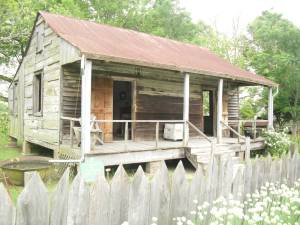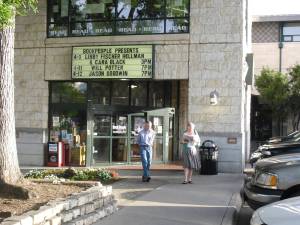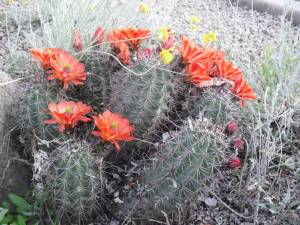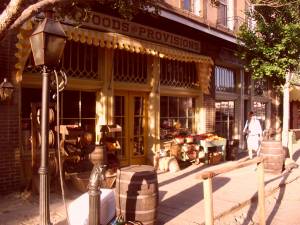At the Central Grocery we queued for a muffaletta the size of a cowpat, and bought Slap Yo’ Mama hot sauce for the home team. A muffaletta is a typically restrained New Orleans ham and cheese sandwich, with added olives, in a bun that could double for the Superbowl. We staggered with the muffaletta over to the banks of the Mississippi, where our uneaten crusts created a tidal wave that threatened to burst the levee and flood the French Quarter.
Here matters were decided by superstitious gestures, by almanacs and eggs broken into a bowl of oil, by imprecations and talismans. Here people sought out propitious days, avoided dark corners, waggled their fingers behind their backs, resorted to nostrums, prayers, and the prognostications of wise women. These were the ordinary calculations of the everyday world…
That’s a passage from An Evil Eye, about Istanbul – but it could just as well apply to New Orleans, with its mojo and voodoo and ghosts and palmists. It is country superstition, bred up out of Africa and France, with more than a dash of seafaring juju thrown in, and to see where it was forged, before it got all dressed up for town, we took the winding river road to Laura, an old plantation house.
Surprisingly small, and brightly painted in violets and yellows, Laura is not the classic plantation house of the Anglo-American southern dream. Before they built the levee, the house – built on brick pilings which form a cool and floodable cellar – had a big view of the Mississippi, but it’s not Tara, at all. The tour is available in French or English; both are excellent, funny and slightly different, the French tour placing more emphasis on the Creole story.
Laura was established and run by a succession of extremely tough Creole Frenchwomen who became tougher as they got older. The Creole world – the world of early Louisiana, before the 1803 Purchase bought it into the fledgling United States – was not especially hung up about race. What mattered was money, inheritance and self-sufficiency – family, in other words. And it was sustained by slavery. Dotted around the gardens are the huge iron cauldrons in which the cane was boiled down into molasses. In the 1830s, the lady president of the plantation went down to New Orleans and bought slaves, mostly women, to breed on the farm; descendants were still living in the old slave cottages as recently as 1974.

As cottages go, they didn’t look too bad – clapboard shells raised off the ground, split into two with a verandha, a room about 14’ square with a fireplace, a kitchen at the back, and a fair bit of garden around. But at Laura it is the fact of slavery, more than the conditions in themselves, which still has the power to shock.
I listened to it all with a sense of recognition. If New Orleans has echoes of Venice, then Louisiana’s Creole Mississippi reminded me of another world I’ve plundered for the Yashim stories. For Aimee Dubucq du Riviery was a Creole, too. She came from a place much like this, on the French Caribbean island of Martinique. If the story is true – and I like it too much to find fault – Aimee wound up becoming Valide, mother of the sultan in Ottoman Istanbul. (Her childhood friend from the same island was Josephine, Napoleon’s Empress).
Of course the Valide is Yashim’s friend in the palace: and like the ladies of Laura she is elderly, tough, and rather terrible.
In the early 1830s Laura’s heir presumptive was a sixteen year old girl with all the graces, but terrible spots. Pooh-poohing the quacks and medicos of New Orleans, her mother took her to Paris for a series of injections. One shot killed the girl.
On her return, the mother closed the door of her room and swore never to leave it again, as long as she lived. She lived twenty years more, with a view of the unchanging river sliding past her window.
On a brighter note, some 14 babies were born in one of these bedrooms; nine lived to be over 100 years old.
‘Take a deep breath, everybody!’ Says the guide.
There is a diner just around the corner, where we order deep fried alligator because we can.
‘It’s just like chicken,’ says the waitress. ‘Only some parts are tougher.’
We are joined at the table by a couple of Vermonters winding up a Blues tour of the Mississippi. They are brothers-in-law, and one of them is a poet. His name is Baron Wormser, and he has sent me a poem he wrote about a book signing. It’s called My Last Borders, and ends this way:
Later in the evening when I have repaired
To the poetry section to gather my slender wits,
I consult the oracle Yeats.
He never drove on Interstates among convoys of 18-wheelers,
Never searched asphalt acres for a parking space
Around Christmas, never took a self-assertion seminar
Or credit management workshop in a fluorescent warehouse.
The chains of commerce never danced for him.
He stood for the soul’s exactions, the flawed
Avid beauty of conscience. I read his poems
And feel better, which is to say, sadder.
Baron lived for twenty years off the grid, with no electricity, like Thoreau.
Dusk. Izzy sits on the pontoon by the lake, where I sip a bourbon on ice. Drakes chase ducks, turtles paddle in the shallows, and birds whoop and caw in the woods that surround the lake. The mosquitoes rise in the still air.

We had brought up directions to Cajun Country Cottages on the laptop, snagging some wi-fi kindly provided by the clerk at a motel en route, but when we came off the interstate into Beaux Bridges the battery had wound down and we drove around rather hopelessly looking for a store where we could plug in and fire up the screen. Baron Wormser would not have approved.
Beaux Bridges seemed to have gone to sleep. The bank was shut, like the fishing tackle store and the café.
I did spot movement in the café, though.
‘We’re having a yoga class right now,’ the lady whispered, cracking the door.
‘We just need electricity, for a moment.’
‘Well, y’all come inside. I think there’s a socket in here.’
We crept in. The chairs and tables had been pushed aside, and a dozen people were folded up on their mats, meditating. Quiet as we tried to be we couldn’t find the socket.
‘I’m so sorry…’
‘Maybe there’s one here,’ the teacher mouthed.
We crashed over the chairs, past the yogis.
‘So sorry.’
‘Excuse me.’
Later we headed out to Mulates, where there’s always music. We ate duck and fried alligator, listening to Joe Cormier with his accordion, singing Cajun songs.














